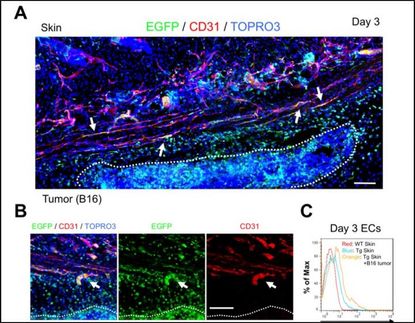New target discovered for treatment of cancer
Researchers at Karolinska Institutet have discovered a new way of blocking the formation of blood vessels and halting the growth of tumours in mice. A substance that exploits this mechanism could be developed into a new treatment for cancer.
For a cancer tumour to be able to grow larger than the size of a pea, the cancer cells need to stimulate the formation of new blood vessels that can supply the tumour with oxygen and nutrients, a process known as angiogenesis. A number of medicines which inhibit angiogenesis have been developed, but their effect has been limited, and there is still a major need for better medicines.
The new results concern a receptor on the surface of blood vessel cells called ALK1. When the researchers blocked ALK1 in tumours in mice, angiogenesis was inhibited and the tumours stopped growing. The ALK1 receptor is activated by a family of signalling proteins called TGF-β proteins that are very important for communication between different types of cell in a wide range of key processes in the body. The study indicates that two members of the TGF-β family (TGF-β and BMP9) work together to stimulate angiogenesis in tumours. ALK1 was blocked partly by genetic means and partly using a pharmaceutical substance called RAP-041.
"We believe that RAP-041 could be used in combination with existing angiogenesis inhibitors to achieve the maximum effect," says associate professor Kristian Pietras, who led the study.
Clinical studies of ACE-041, the human equivalent of RAP-041, have already been begun in the USA by the company that holds the patent on the substance. One goal of these studies is to find out which types of tumour are most sensitive to ALK1 blockade.
Original publication: Sara Cunha, Evangelia Pardali, Midory Thorikay, Charlotte Anderberg, Lukas Hawinkels, Marie-José Goumans, Jasbir Seehra, Carl-Henrik Heldin, Peterten Dijke, Kristian Pietras; "Genetic and Pharmacological Targeting of Activin Receptor-like Kinase 1 Impairs Tumor Growth and Angiogenesis"; The Journal of Experimental Medicine 2010.
Most read news
Organizations
Other news from the department science

Get the life science industry in your inbox
By submitting this form you agree that LUMITOS AG will send you the newsletter(s) selected above by email. Your data will not be passed on to third parties. Your data will be stored and processed in accordance with our data protection regulations. LUMITOS may contact you by email for the purpose of advertising or market and opinion surveys. You can revoke your consent at any time without giving reasons to LUMITOS AG, Ernst-Augustin-Str. 2, 12489 Berlin, Germany or by e-mail at revoke@lumitos.com with effect for the future. In addition, each email contains a link to unsubscribe from the corresponding newsletter.
More news from our other portals
Last viewed contents
QIAGEN Expands Partnership with Genome Diagnostics for Development of Tests in Prevention and Personalized Healthcare - Extended HLA testing portfolio includes products to assess tolerance for Lumiracoxib and for the early detection of inflammatory diseases





















































